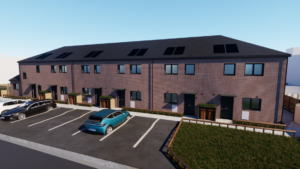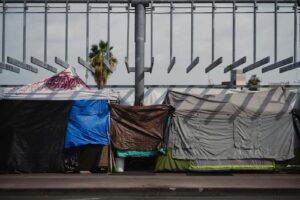Citizens plan ‘back garden housing’ revolution in Bristol
 ‘If we’re going to fix housing we need more than housing experts,’ says Melissa Mean from Knowle West Media Centre in Bristol.
‘If we’re going to fix housing we need more than housing experts,’ says Melissa Mean from Knowle West Media Centre in Bristol.
‘There are rich resources at the super-local level which we’ve tapped into to create a housing plan that puts people and communities at its heart’.
We Can Make has worked with local residents, artists and makers to come up with an affordable housing plan for the Knowle West area of Bristol that turns the developer-led model on its head.
An initiative of Knowle West Media Centre, a community organisation based in the area for over 20 years, and White Design architects, We Can Make unveiled its first prototype home last week during Bristol’s Festival of the Future City.
The organisation knocked on doors in the neighbourhood to gain an understanding of the current housing needs of the population. Knowle West was built to house people cleared from inner-city slums in the inter-war period and was created using ‘garden city’ principles.
Today, however, Knowle West is disconnected from the city’s economic opportunities, many of its neighbourhood facilities have closed, and half of its three-bed homes are housing only one or two people. Many of the population are looking for smaller properties allowing them to down-size or fit their changing mobility needs, without moving from the neighbourhood. Younger people in the area are struggling to afford market rent or get a stake in the housing market.
We Can Make discovered 1500 plots within the neighbourhood, on small pieces of vacant land and at the end of people’s gardens, on which a one or two bed affordable houses could be based, and has created a range of collective tools to help citizens to get them built.
A prototype house was launched last week, built using local labour, and citizens, including the mayor of Bristol, have been trying out the space by spending the night there.
Introducing the scheme at Bristol’s Festival of the Future City, Melissa Mean said: ‘This model can work for council tenants and owner-occupiers. While developers won’t build unless they make a 20% profit, our model re-invests any profit back into the community, and allows local people to decide what it should be spent on.’
The prototype house was built in 10 weeks, with walls made from straw bale panels and triple-glazed windows. A community suppliers’ framework and a community design code have been created to help streamline the planning process and make it easier for local people to develop new homes on microsites.
Bristol council is a partner in the scheme, which wants to ‘deliver housing at the point of need’. It has plans to build 350 homes in the area, with delivery beginning next spring.
Paul Smith, cabinet member for housing at Bristol Council said: ‘The housing market continues to fail to deliver what people and communities need. We need new imaginative solutions which build homes and communities with and for the people. We Can Makes offers a groundbreaking alternative which can be scaled up to provide the numbers of high quality homes we need where communities want them. Bristol Council is excited to be a partner to this project which could set a new model for estates across the UK.’
Craig White of White Design architects said: ‘This reverses the policy of master-planning. We are re-writing housing policy from the ground up.’
- Read the We Can Make report here.















